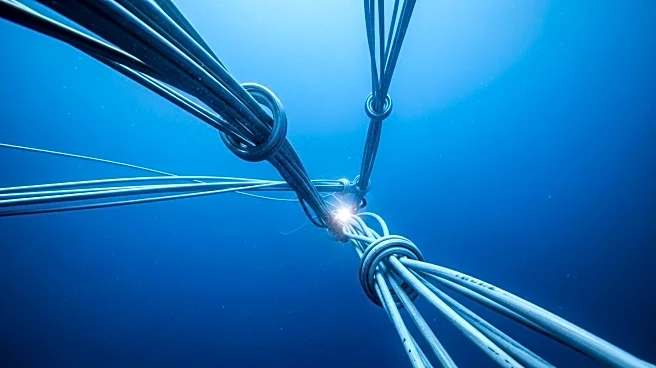What is the story about?
What's Happening?
Recent reports have highlighted growing security concerns regarding the ownership of submarine data cables by Chinese companies, particularly Citic Telecom CPC, which operates cables in the Baltic Sea. These cables connect Finland, Estonia, and Sweden, and are considered critical infrastructure. The Finnish National Cyber Security Centre has expressed concerns over the potential access to data traffic by those who control these cables. Although there are no allegations of misuse, the ownership by a Chinese state-owned firm has raised alarms due to the strategic importance of these cables for NATO countries. The cables are part of China's broader Digital Silk Road initiative, which aims to expand Chinese technological infrastructure globally.
Why It's Important?
The control of submarine cables by Chinese entities poses significant national security concerns for the United States, European Union, and NATO countries. These cables are vital for data transmission and communication, and their control could potentially allow for data interception or disruption. The situation underscores the geopolitical tensions surrounding China's expanding influence in global infrastructure. The U.S. has previously taken steps to limit Chinese involvement in its telecommunications infrastructure, reflecting broader concerns about espionage and data security. The issue also highlights the strategic vulnerabilities of critical infrastructure in the face of global power shifts.
What's Next?
In response to these concerns, there may be increased regulatory scrutiny and potential policy measures to limit Chinese involvement in critical infrastructure projects. The U.S. is reportedly considering new regulations to restrict the use of Chinese technology in data cables. This could lead to a reevaluation of existing agreements and the development of alternative infrastructure solutions by NATO countries to mitigate security risks. Ongoing geopolitical developments, such as China's support for Russia, may further influence the strategic decisions of Western nations regarding infrastructure security.
Beyond the Headlines
The situation reflects broader ethical and strategic considerations in international relations, particularly the balance between economic cooperation and national security. The control of critical infrastructure by foreign entities raises questions about sovereignty and the potential for geopolitical leverage. As global reliance on digital infrastructure grows, the security of these systems becomes increasingly paramount, prompting nations to reassess their dependencies and alliances.















